#Governance in ancient Israel
Text
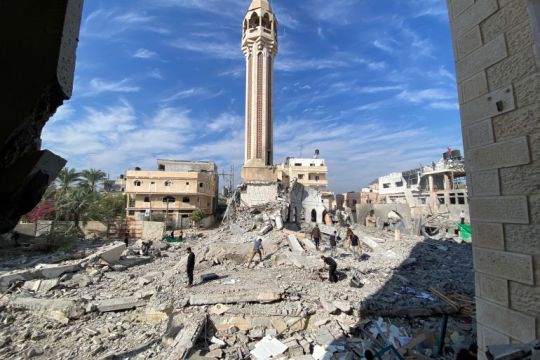
Hamas says Gaza mosque destroyed, urges UNESCO to save heritage
The Great Omari Mosque has been reduced to rubble, with only its ancient minaret standing, according to images released by the Palestinian group.

The Othman bin Qashqar Mosque, also in Gaza City, was hit by air raids on Thursday, Hamas said. It also condemned the destruction of the Hammam al-Samara, the last Turkish-style bath in the territory, where Gaza Palestinians had bathed for more than 1,000 years.
The Palestinian group, which has governed the Gaza Strip since 2007, said three churches had also been destroyed, including the 1,000-year-old Greek Orthodox Church of Saint Porphyrius, the oldest still active in the territory.
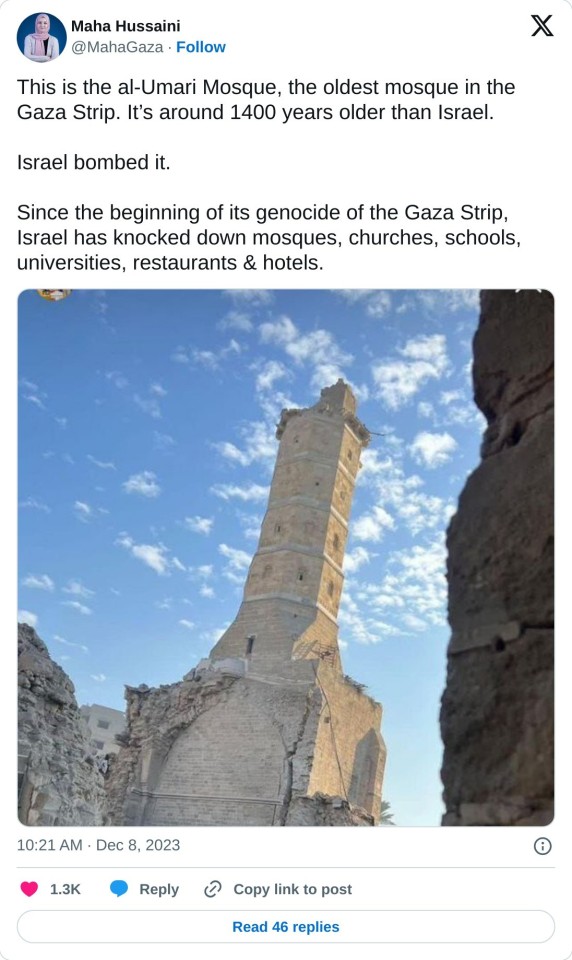
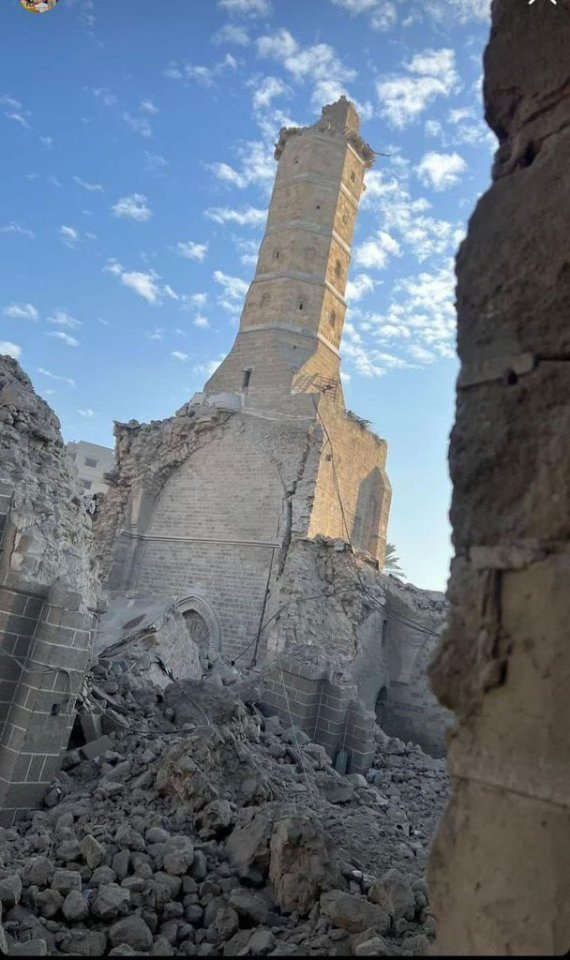
This is the al-Umari Mosque, the oldest mosque in the Gaza Strip. It’s around 1400 years older than Israel.
Israel bombed it.
Since the beginning of its genocide of the Gaza Strip, Israel has knocked down mosques, churches, schools, universities, restaurants & hotels.
— Maha Hussaini (@MahaGaza) December 8, 2023
4K notes
·
View notes
Text
Just days after US Army Major Harrison Mann resigned, the Biden administration has been hit with another major resignation, this time Lily Greenberg Call, special assistant to the Chief of Staff
An interior department staffer on Wednesday became the first Jewish political appointee to publicly resign in protest of US support for Israel’s war in Gaza.Lily Greenberg Call, a special assistant to the chief of staff in the interior department, accused Joe Biden of using Jews to justify US policy in the conflict.
Call had worked for the presidential campaigns of both Biden and Kamala Harris, and was a longtime activist and advocate for Israel in Washington and elsewhere before joining the government.
She is at least the fifth mid- or senior-level administration staffer to make public their resignation in protest of the Biden administration’s military and diplomatic support of the now seven-month Israeli war against Hamas.
She is the second political appointee to do so, after an education department official of Palestinian heritage resigned in January.Her resignation letter described her excitement at joining an administration that she believed shared much of her vision for the country. “However, I can no longer in good conscience continue to represent this administration,” she wrote.
In an interview with the Associated Press, Call pointed to comments by Biden, including at a White House Hanukkah event where he said “Were there no Israel, there wouldn’t be a Jew in the world who was safe” and at an event at Washington’s Holocaust Memorial last week in which he said the 7 October Hamas-led attacks that triggered the war were driven by an “ancient desire to wipe out the Jewish people”.
“He is making Jews the face of the American war machine. And that is so deeply wrong,” she said, noting that ancestors of hers were killed by “state-sponsored violence”.
The resignation letter:
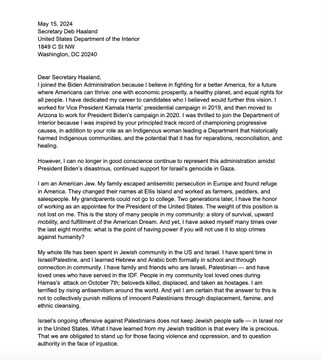
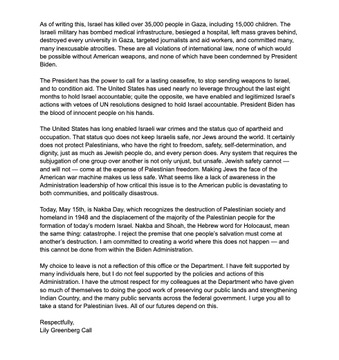
#yemen#jerusalem#tel aviv#current events#palestine#free palestine#gaza#free gaza#news on gaza#palestine news#news update#war news#war on gaza#genocide joe#joe biden#gaza genocide#genocide#edited
1K notes
·
View notes
Text
Pinkwashing as a concept is astonishing to me because it operates under the assumption that everything Israel does is for global PR.
Jews have a 6,000 year history of being more chill about gay people than (most) other religions. Jews overwhelmingly favour Queer rights in the diaspora, where Israeli law doesn’t affect us. Kabbalah regards Adam Kadmon, a genderless or multi-gendered being, as the first human, and says that their gender identity made them significantly more divine. Ancient Israeli laws documented in the Talmud make room for multiple different forms of intersex conditions.
But yeah Israel having a pretty good record on Queer rights is just because the Jews care desperately about our global image in the media. Israel having the biggest pride parade in Asia is exclusively a marketing tool that somehow convinces people to hate Palestinians. And clearly the Israeli government just handed down these Queer rights from on high to please the West. It’s not like normal Queer Israeli citizens have organized well-documented, long and difficult struggles against their government for equality and representation.
“Pinkwashing” my ass. Queer people in Israel fought hard for those rights. If Israel ceases to exist, those rights will disappear. They have good reason to be scared of Hamas, the Houthis and Iran, regardless of if they’re Queer Jews or Queer Palestinians or Queer Bedu. And yet Queer Israelis were protesting Netanyahu’s government and policy decisions before October 7, and they continue to protest what’s happening in Gaza now. They should be the sort of people you look up to instead of the sort of people you dismiss offhand. They aren’t a PR stunt. They’re human fucking beings.
2K notes
·
View notes
Text
Conversation between me, and another high educated Jewish women whose opinions I respect
Her: What's missing here are the facts. If we stuck to the facts there wouldn't be so much intensity surrounding this issue.
Me: But you and I are both highly educated Jewish women, and we can't even agree on the facts regarding the history of Palestine as a place name, ethnic identifier, and nation. If we can't even agree on those facts, how on earth can facts help anyone move forward?
There's the question. Not just for Jews, but for everyone involved in, or concerned with this conflict. How do we move forward if multiple sides of the room dispute the veracity of such basic statements as:
-Jews are a globally oppressed minority ethnic group, the hatred of which is deeply embedded in Western thought and rhetoric.
-The Naqba was a period of ethnic cleansing in which the government and military of the new State of Israel expelled Palestinian Arabs from their homes and property; a dispossession and a series of events which continue to traumatize and negatively impact the lives and livelihoods of Palestinians.
-The Holocaust was a traumatic event in the history of the Jewish people, the legacy of which is embedded in the psyches, world views, and collective trauma of the Jewish people, and invariably impacts how this group views global issues.
-Palestinian Arabs had a full developed sense of identity and statehood before the British Empire fucked off, and made their discomfort with increasing Jewish emigration clear to the British before the outbreak of the Second World War.
-Jews had nowhere to go before, during, or really, after the Holocaust; and the governments of many Arab States ethnically cleaned their own ancient Jewish communities in retribution for the creation of the State of Israel.
-The State of Israel does not exist because the Holocaust happened, or as an "apology" for said event.
THIS POST COMPRISES A SERIES OF RHETORICAL QUESTIONS MEANT TO MAKE US APPRECIATE THE DEPTHS OF THE DISCURSIVE PROBLEMS HERE; NOT A POST FOR "DISCOURSE" AND HATEFUL, AGGRESSIVE SHIT.
If you feel you have to do that, copy & paste into your own separate post.
1K notes
·
View notes
Text
A few days ago, in my quest to fight the antisemitism that lifted its head around the world following the massacre of October 7th, I stumbled upon a clip from a UN assembly where the speaker asked a simple question-
Dear Arab world, where are your Jews?
A lot of people think that Israeli roots come from Europe exclusively. But in fact, Jewish people were hunted in all corners of this world. In Europe, of course, but also in Asia, Africa and other places all over the planet.
My grandma is an Iraqi Jew. Iraqi Jewish community is one of the oldest Jewish communities in the world, being the direct descendants of the Babylonian exile Jews, so ancient it is an exile mentioned in the Bible.
Recent studies, in which DNA retrieved from canaanite burial lands was compared to current populations in the area of ancient Canaan, has found that Iraqi Jews share the highest similarity to canaanite DNA out of all Jewish communities, more than 50% of the DNA on average.
All the beautiful, peaceful Jewish communities of the Arab world were wiped out in the blink of an eye.
The Arabic world has never treated their Jewish communities as equal citizens, oftentimes robbing them of any rights and performing violent acts of genocide against them (check 'Farhud' on Google).
But their voice was silenced once they fled to Israel.
So I decided to recap my grandma's story in the comments of the clip:

Soon after, many Jewish people with Arabic, or 'Mizrahi' heritage, shared their stories as well:


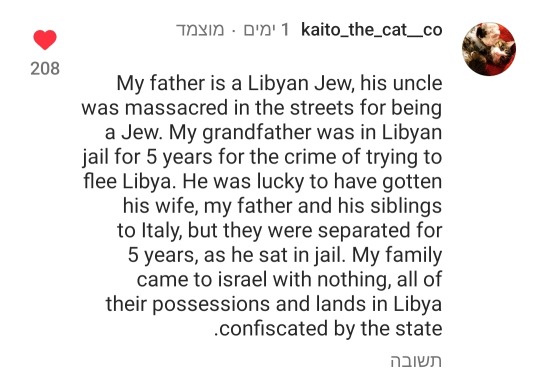




Jewish people all over the planet were driven out of their homes, ethnically cleansed by their neighbors, rulers, and governments.
We are still not welcome in most of the countries of the Arab world. Unable to see glimpses of our history.
My grandma still wishes she could see the house she grew up in. Holding the memories, but unable to set foot in that land, because she would be executed.
Nevertheless, she's not a refugee. She might've fled to Israel, but in Israel, her family got equal rights as citizens, and she built a house on a land she now calls her home.
Don't erase my grandma's story. Don't erase the Jewish ethnic cleansing that brought her to seek a safe haven in Israel.
Israel is a home for more than half of the Jewish people on this planet. Out of the ~8,000,000 Jews who live in Israel, there are about ~2,500,000 Jews of Mizrahi heritage.
And as Golda Meir once said: "our secret weapon is that we have nowhere else to go."
#omi talks#jewish#Iraqi Jews#jumblr#israel#mizrahi jews#canaan#I hate the fact that Israel only trends on this hellsite when people wish its destruction#it's never two state solution it's always 'from the river to the sea'#that's just messed up
1K notes
·
View notes
Text
something i think gentiles do not get abt judaism is that it’s not a religion in the modern sense. rabbinic judaism as we know it today exists because of the roman destruction of judea and subsequent genocide and expulsion of a huge number of the judeans living there. prior to that, there were judeans who lived outside judea and still participated in many judean practices and followed many judean laws. there was a conversation happening particularly in the rabbinic movement (which was an incredibly small and fringy movement btw) about how to maintain a cohesive identity and community with members of an ethnic group that had stayed in babylon after being released from slavery or had moved to the italian peninsula or to egypt, and that identity was beginning to form. jewish identity was becoming something we might recognize today.
but prior to the roman expulsion and destruction of the temple, that identity had been centered around the land and the temple for very obvious reasons. ancient israel, judea, it was a place and the people who lived there lived under the same governance with the same culture and the same language. it makes sense they’d be a unique ethnic group. another huge part of the identity they’d formed was opposition to occupying forces, greeks, babylonians, assyrians, and finally the romans. eretz yisrael was constantly under occupation. and rebellion was a unifying force for these people. so when suddenly they have no land to defend, no central temple to look toward, suddenly the rabbis’ outlook on “portable judaism” was pretty much the only option if they wanted to remain a coherent group. they started communicating with each other over thousands of miles and multiple continents, discussing how to maintain their identity while in exile. and that is how judaism formed. it wasn’t a belief system that was spread throughout the world like christianity. it was a group of people whose population and homeland was devastated by a brutal occupying force who were trying to hold on to the only thing they had in strange lands where people weren’t always very welcoming: community. particularly in places like eastern and central europe where jews physically looked so different than the rest of the population, their culture was so different, and europeans reacted very violently to that, holding onto their traditions and immersing themselves in the study of how to stay connected is the reason those communities still exist today. they could have just moved to a new place and assimilated into the populations there and we would not have jews today. the reason we have jews today is because of that communal decision, across continents, to stay connected.
487 notes
·
View notes
Text
Palestine Action activists destroyed a 1914 painting of Arthur James Balfour, the colonial administrator and signatory of the Balfour Declaration.
Palestine Action stated, "An activist slashed the homage and sprayed the artwork with red paint, symbolising the bloodshed of the Palestinian people since the Balfour Declaration was issued in 1917. "
"Arthur Balfour, then UK Foreign secretary, issued a declaration which promised to build “a national home for the Jewish people” in Palestine, where the majority of the indigenous population were not Jewish. He gave away the Palestinians homeland — a land that wasn’t his to give away."
"After the Declaration, until 1948, the British burnt down indigenous villages to prepare the way; with this came arbitrary killings, arrests, torture, sexual violence including rape against women and men, the use of human shields and the introduction of home demolitions as collective punishment to repress Palestinian resistance."
"The British were initiating the ethnic cleansing of Palestine, fulfilling the Zionist aim to build their ‘home’ over the top of what were Palestinian communities, towns, villages, farms and ancestral land, rich in heritage, culture and ancient archeological history."
"In the past 154 days of genocide in Gaza, Israel has killed over 30,000 Palestinians, injured over 72,000 and displaced over 1.9million — 80% of the Gaza population."
"Britain’s support for the continued colonisation of Palestine hasn’t wavered since 1917.
"Elbit Systems, Israel’s largest arms supplier, who use captive Palestinians in Gaza as a human laboratory to develop their weapons, use Britain as a manufacturing outpost. The Israeli weapons maker build weaponry in factories across the country and work closely with the British government.
"Palestine Action vows to continue their direct campaign until Elbit is shut down and British complicity with the colonisation of Palestine ends. "
#palestine#free palestine#gaza#free gaza#israel#jerusalem#tel aviv#gaza strip#yemen#from the river to the sea palestine will be free#joe biden#benjamin netanyahu#britain#uk#arthur james balfour#balfour declaration#palestine action
689 notes
·
View notes
Text

THE SUDRA
The sudra is a traditional Jewish headdress with a history dating back thousands of years to the Biblical period and ancient Mesopotamia. It was worn like a turban or a headscarf and was of great spiritual importance at various points throughout history; for example, it’s mentioned directly in the Babylonian Talmud (written between the years 500-700). There are also some likely references to it in the Tanakh, such as in Exodus and the Book of Ruth.
CUSTOMS
Beyond spiritual significance, the Babylonian Talmud describes how it is customary to let another man hold one’s sudra as a gesture of trust during a monetary transaction.
In the Shulchan Aruch, there is an exemption for the sudra regarding the use of tzitzit. Even though the sudra is a four-cornered garment, tzitzit aren’t required.
Among Sepharadim, the sudra was worn over the shoulders like a scarf, while Ashkenazim wore it “coiled round the body like an Egyptian snake” or like the “kaftanis of the Tatars” when worn on the head. In fact, the sudra is likely the predecessor of the shtreimel (the fur hat worn by some Ashkenazi Jewish men), as Ashkenazi Jews in Europe eventually replaced the scarf with more weather-appropriate fur.
SUDRA IS OUTLAWED
With the expansion of the Arab and Islamic empires starting in 632 CE, Jews became “dhimmis,” relegated to second class citizenship and a whole host of prohibitions. Among those prohibitions was the use of the sudra. For example, in Yemen in 1667, the Jewish sudra was banned, likely to humiliate the Jewish community by forcing them to place regular clothes on their heads. The Jewish community bribed some government officials to reverse the decision. Ultimately a deal was struck where Jews were permitted to wear the sudra so long as it was made of bad quality cloth.
As the Arab keffiyeh became associated with Arab Muslims of high status, Arab rulers once again instituted prohibitions on the Jewish sudra because it was too similar to the keffiyeh.
DECLINE AMONG ASHKENAZIM
Jews in Europe still used the traditional sudra well into the 16th century, some 1500 years after their exile from Judea (Israel-Palestine today). In the Shulchan Aruch, Rabbi Moses Isserles specifically mentioned the significance of the sudra among Ashkenazim.
In the Middle Ages, the use of turbans such as sudras were outlawed in Europe, resulting in the gradual decline of the sudra among Ashkenazi Jewry. Eventually the sudra evolved into other forms of “legal” and weather-appropriate dress, such as the shtreimel, as discussed previously.
DECOLONIZATION OR APPROPRIATION?
Among other things decolonization is the process of removing the layers of oppressive foreign imperial and colonial influence imposed upon one’s culture. As discussed, Jews have worn the sudra since ancient times, dating back thousands of years. The garment came into disuse due to the oppressive laws of powerful empires, both in Southwest Asia/North Africa and among Jews in Europe. Reclaiming the sudra, which also happens to be of great spiritual significance, is an act of decolonization.
The keffiyeh, which uses a similar pattern, became a symbol of Palestinian nationalism and resistance in the 1930s (after longtime use among Palestinian farmers and others in Arab nations). Kurds, Persians, Yazidis, and other Indigenous Southwest Asian groups also traditionally use keffiyehs. In fact, the keffiyeh and the sudra likely have the same origin; that said, the sudra predates the keffiyeh by hundreds of years.
The Jewish reclamation of the sudra should not be weaponized to harm Palestinians. That said, claiming that Jews are “appropriating” keffiyehs while using the sudra is absurd, seeing as the sudra not only came before the keffiyeh, but is also a garment of spiritual significance for Jews that was still used relatively recently in the scope of Jewish history. Ultimately, we have to remember that Jews and Palestinians are historic, cultural, and ethnic cousins, and, as such, some parts of our cultures will overlap.
#jumblr#jewblr#jewish tumblr#judaism#jewish#jewish history#funkowrites#antisemitism#rootsmetals#stop antisemitism
166 notes
·
View notes
Note
Hi opencommunion - you are one of my favourite Tumblrs and I love hearing about Lebanese history from you. You say you are antiPhoenicianist - I hope you would tell us more about it. Hope you're having a great day.
aww thanks, I love your blog too <3
Phoenicianism is a Lebanese ethnonationalist ideology that basically argues that Lebanese people are ethnically/culturally unrelated to (and, implicitly or explicitly, superior to) not only other Arabs but other Levantine peoples. It's a secular ideology but it's extremely Islamophobic, so it posits that Lebanese Christians (especially Maronites) are the "purest" Lebanese people with a direct line of descent from the Phoenicians, who are portrayed as an almost supernaturally heroic and advanced culture who were supplanted by savage Arabs from the south (you probably recognize this as a Zionist talking point; more on that later). It's a narrative of Lebanese history that originates from rich European-educated Lebanese and their French & English orientalist buddies, and it bears all the hallmarks of European ethnonationalism and scientific racism. In my experience ascribing to Phoenicianism is associated with class and it doesn't represent the majority of Lebanese Maronites, who do consider ourselves Arabs. My family are dyed-in-the-wool Maronites from Wadi Qadisha, the cradle of Maronite culture, and for as far back as our family histories go we've always described ourselves as Arabs, with religion being the only difference—and an unimportant difference—between us and our Druze and Muslim neighbors.
Phoenicianism predates the Zionist occupation but it started to take shape around the same time as Zionism, and is based in the same core orientalist myth: that the ancient Levant was populated by strictly separate and homogenous ethnocultures with exclusive claim over portions of the land, which were later supplanted by Arab Muslim invaders who oppressed a tiny remaining local population. (In reality, of course, SWANA cultures have always been internally diverse and mutually influential, and "Arabization" in the Levant was characterized by organic cultural shifts among local populations, with Arab culture influencing and combining with local cultures rather than replacing them).
So when the Zionist settler project arrived they found easy allies in Phoenicianism. This relationship eventually culminated with the settler state backing the fascist Lebanese Phalanges Party (Kataeb in Arabic, a direct translation of Falange, the Spanish fascist party that inspired its founders) in the Lebanese Civil War. Israel used the Phalanges as a proxy to fight the Palestinian resistance in Lebanon, and it was Phalangists who collaborated with IOF to carry out the Sabra and Shatila massacres. This is the cruelest and ugliest moment in Lebanon's history and Phoenicianism enabled it; Phoenicianism enabled the cognitive dissonance necessary for Lebanese to participate in the occupation's genocide against our siblings and act as footsoldiers for the European fascist agenda in our region. The Phalangists and Zionists lost the war but there is still a Phalangist presence in the Lebanese government, and Phoenicianism is unfortunately alive and well among the Lebanese right wing at home and in the diaspora
380 notes
·
View notes
Text
A Zionist argument you might hear is that the Palestinian identity was only constructed very recently, either during the establishment of Israel or just prior, and that for this reason they're really just generic Arabs who could just move to other Arab countries. Palestinian historians have responded to this claim by looking for earlier signs of identification with Palestine, but regardless of how far back you can find these, it doesn't really matter when it comes to the question of what Israel is and what it's doing.
The issue of settler colonialism isn't about which people "belong" in a certain place or whether their people is "ancient" enough or have some "connection to the land" that gives them a right to live there. Settler colonialism means displacement and violence enacted on a group of people, and whether they previously identified as a singular people or many, they now share that common experience of being colonised. The category of "indigenous" or "native" is one that's constructed in the process of colonisation, not a natural category that someone belongs to by virtue of their ancient bloodline.
Even if people only began to identify as Palestinian in response to Israeli colonisation (which is not true, to be clear) it would not matter. Israel is enacting completely unjustified violence on innocent people. It has been displacing them since its inception (continuing the policy of the British colonial government which favoured European Jewish settlers and sold them land that was already inhabited) and is continuing to do so today, particularly in the West Bank. This isn't even getting into the treatment of those who live within the official borders of Israel.
The name for this is settler colonialism. It's completely unjustified, as every case of settler colonialism is, and it does not change character because of the historical identities of the colonisers or the colonised. Plenty of Jewish people have connections to the land, either recent or ancient, but it does not give them a "right" to engage in colonialism. Nobody "belongs" anywhere; people should be able to move and live where they want, but this does not justify the continuous, violent displacement of innocent people.
The only way to stop this violence is the dismantling of Israel and the creation of an independent, secular Palestine, with reparations for the displaced Palestinians, and equal political status for all, regardless of religion or ethnicity.
404 notes
·
View notes
Note
https://www.tumblr.com/beigale-shtuchim/749006144592379904?source=share
https://www.tumblr.com/the-catboy-minyan/749015310244446208?source=share
This whole thread is shit tbqh as per usual with smol bean zionists but I wanted to take the opportunity to know your opinion as an open anti-zionist jewish person abt the point near the end of the og chain:
Is it true that at some point in history jews are/were indigenous to the same land without that inherently denying Palestinian roots? Also wtf do they mean with "The Arab Empire" colonizing Palestine???
These are all gen doubts btw you're cool with cool opinions so that's why I'm asking lul
its true that jews lived in eretz yisrael, the geographic land of biblical israel, until the destruction of the second temple around 2000 years ago (and not all of them, even before this there were jews living in various other places) but this really has nothing to do with claims of being indigenous today. the concept of indigeniety is specifically in relation to colonization and modern colonialism. the history of movements of people and the collapse of ancient empires, tribes, kingdoms is really complicated and long, and in palestine in particular there were a lot of different periods of rule and different religious groups living there. i dont really study ancient history or biblical history but there is a lot you can read on it. its not denying palestinian roots to say this because who lived where thousands of years ago and the religious significance of a geographic location doesnt change the settler colonial nature of the modern nation state of israel. its a purposeful misunderstanding of modern colonialism when zionists say this, and ignorance of the academic work that shows israel operates like other settler colonies, and that the basis for something being settler colonial is actually material in terms of the aims, government structure, land policy, displacement and dispossession, justifications for colonization, and economic relations between colonizers and colonized, not religion or ancient history. this article Settler Colonialism and the Elimination of the Native is pretty good
and zionists also are probably referring to ancient islamic empires when they talk about arab colonization, which again is really not the same thing as modern colonialism
theres a few posts in my tag for resources and for anti zionism that have links of books about this
also decolonizepalestine.com
154 notes
·
View notes
Text
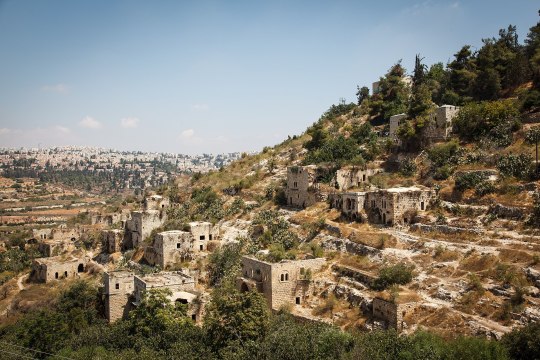
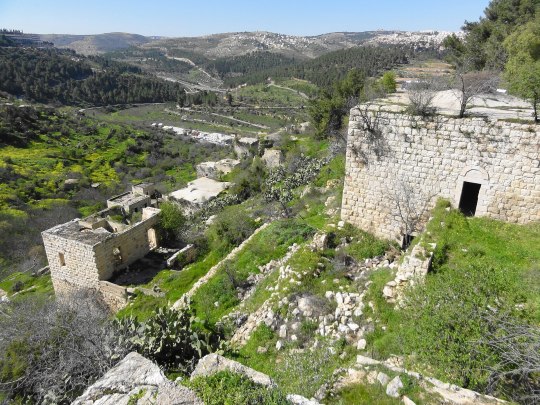
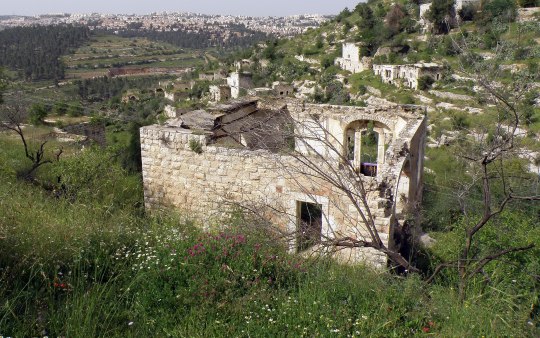
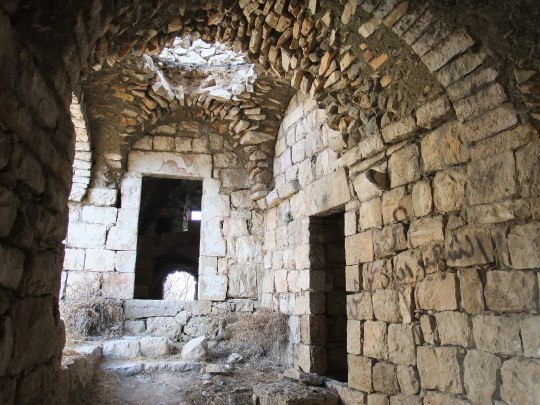
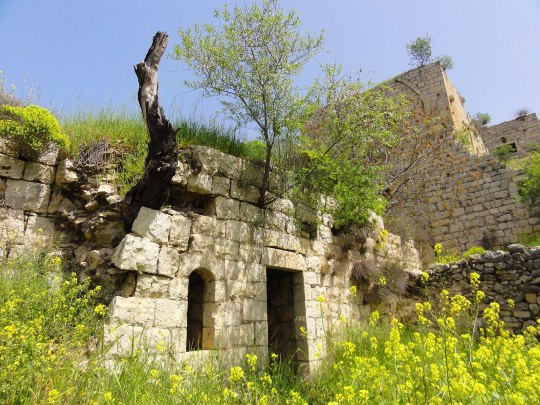
when the homes in the depopulated palestinian village of lifta were originally built is impossible to tell and most likely varies from house to house. the area's been known since ancient times, including having been written about in the hebrew bible. it's retained multiple different names throughout history - lifta by romans, nephto by byzantines, clepsta by crusaders, then lifta again by arabs. in more recent times, the area saw battle in the early 19th century, when it saw a peasant's revolt against egyptian conscription and taxation policies. (egyptian-ottoman ruler muhammad ali had attempted to become independent from the ottoman empire, and sought to use the area of "greater syria" which palestine was apart of as a buffer state.)
the village was predominantly muslim with a mosque, a maqām for local sage shaykh badr, a few shops, a social club, two coffee houses, and an elementary school which opened in 1945. its economy was based in farming - being a village of jerusalem, farmers would sell their produce in the city's markets. an olive press which remains in the village gives evidence to one of the most important crops its residents farmed. the historically wealthy village was known for its intricate embroidery and sewing, particularly of thob ghabani bridal dresses, which attracted buyers from across the levant.
lifta also represents one of the few palestinian villages in which the structures weren't totally or mostly decimated during the 1948 nakba. 60 of the 450 original houses remain intact. from zochrot's entry on lifta:

israel's absentee property law of 1950 permits the state to expropriate land and assets left behind, and denies palestinians the right to return to old homes or to reclaim their property. it's estimated that there's around 400,000 descendants of the village's original refugee population dispersed in east jerusalem, the west bank, jordan, and the palestinian diaspora.
like many depopulated palestinian houses, some of those in lifta were initially used to settle predominantly mizrahi immigrants and refugees, in this case 300 jewish families from yemen and kurdistan. the houses weren't registered in their names, and the area generally saw poor infrastructure and no resources including water and electricity provided by the government. most left in the early 1970s as a part of a compensation program to move out people who'd been settled in depopulated palestinian houses - if they didn't, they were referred to as "squatters" and evicted. (holes were even drilled in the roofs of evacuated buildings to make them less habitable). the 13 families which remain there today only managed to do so because they lived close to the edge of the village.
in 1987, the israeli nature reserves authority planned to restore the "long-abandoned village" and turn it into a natural history center which would "stress the jewish roots of the site", but nothing came of it. several more government proposals on what to do with the land had been brought up since then. this culminated in in 2021 when the israel land administration announced without informing the jerusalem municipal authorities that it issued a tender for the construction of a luxury neighborhood on the village's ruins, consisting of 259 villas, a hotel, and a mall. since 2023, they've agreed to shelve and "rethink" these plans after widespread objection.
the reasons for the objections varied significantly between the opposing israeli politicians - who see the village as an exemplar of cultural heritage and "frozen in time" model of palestinian villages before 1948 - and palestinians - who largely see the village as a witness of the nakba and a symbol of hope for their return. lifta is currently listed by unesco as a potential world heritage site, a designation netanyahu has threatened to remove several times.
many palestinians who are descendent from its former residents still live nearby. like with many other depopulated palestinian villages, they've never ceased to visit, organize tours of the village, and advocate for its preservation.
#palestine#info#nakba#my posts#the dresses link isnt specific to lifta thobs but provides a good overview#i couldn't find anything online abt lifta's embroidery but some of the book pdfs on palestinian costume i reblogged a while ago have info
399 notes
·
View notes
Text
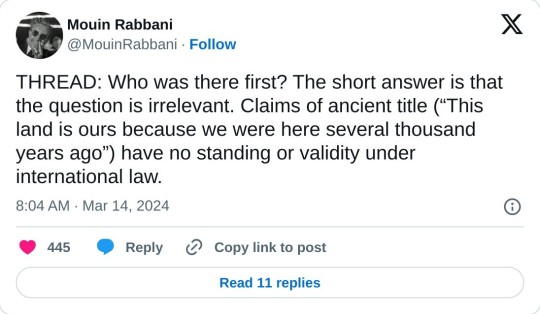
twitter thread by Mouin Rabbani
March 14, 2024
Who was there first? The short answer is that the question is irrelevant. Claims of ancient title (“This land is ours because we were here several thousand years ago”) have no standing or validity under international law.
For good reason, because such claims also defy elementary common sense. Neither I nor anyone reading this post can convincingly substantiate the geographical location of their direct ancestors ten or five or even two thousand years ago.
If we could, the successful completion of the exercise would confer exactly zero property, territorial, or sovereign rights.
As a thought experiment, let’s go back only a few centuries rather than multiple millennia. Do South Africa’s Afrikaners have the right to claim The Netherlands as their homeland, or even qualify for Dutch citizenship, on the basis of their lineage?
Do the descendants of African-Americans who were forcibly removed from West Africa have the right to board a flight in Atlanta, Port-au-Prince, or São Paolo and reclaim their ancestral villages from the current inhabitants, who in all probability arrived only after – perhaps long after – the previous inhabitants were abducted and sold into slavery half a world away?
Do Australians who can trace their roots to convicts who were involuntarily transported Down Under by the British government have a right to return to Britain or Ireland and repossess homes from the present inhabitants even if, with the help of court records, they can identify the exact address inhabited by their forebears? Of course not.
In sharp contrast to, for example, Native Americans or the Maori of New Zealand, none of the above can demonstrate a living connection with the lands to which they would lay claim.
To put it crudely, neither nostalgic attachment nor ancestry, in and of themselves, confer rights of any sort, particularly where such rights have not been asserted over the course of hundreds or thousands of years.
If they did, American English would be the predominant language in large parts of Europe, and Spain would once again be speaking Arabic.
Nevertheless, the claim of ancient title has been and remains central to Zionist assertions of not only Jewish rights in Palestine, but of an exclusive Jewish right to Palestine.
For the sake of argument, let’s examine it. If we put aside religious mythology, the origin of the ancient Israelites is indeed local.
In ancient times it was not unusual for those in conflict with authority or marginalized by it to take to the more secure environment of surrounding hills or mountains, conquer existing settlements or establish new ones, and in the ultimate sign of independence adopt distinct religious practices and generate their own rulers. That the Israelites originated as indigenous Canaanite tribes rather than as fully-fledged monotheistic immigrants or conquerors is more or less the scholarly consensus, buttressed by archeological and other evidence. And buttressed by the absence of evidence for the origin stories more familiar to us.
It is also the scholarly consensus that the Israelites established two kingdoms, Judah and Israel, the former landlocked and covering Jerusalem and regions to the south, the latter (also known as the Northern Kingdom or Samaria) encompassing points north, the Galilee, and parts of contemporary Jordan. Whether these entities were preceded by a United Kingdom that subsequently fractured remains the subject of fierce debate.
What is certain is that the ancient Israelites were never a significant regional power, let alone the superpower of the modern imagination.
There is a reason the great empires of the Middle East emerged in Egypt, Mesopotamia, Persia, and Anatolia – or from outside the region altogether – but never in Palestine.
It simply lacked the population and resource base for power projection. Jerusalem may be the holiest of cities on earth, but for almost the entirety of its existence, including the period in question, it existed as a village, provincial town or small city rather than metropolis.
Judah and Israel, like the neighboring Canaanite and Philistine entities during this period, were for most of their existence vassal states, their fealty and tribute fought over by rival empires – Egyptians, Assyrians, Babylonians, etc. – rather than extracted from others.
Indeed, Israel was destroyed during the eighth century BCE by the Assyrians, who for good measured subordinated Judah to their authority, until it was in the sixth century BCE eliminated by the Babylonians, who had earlier overtaken the Assyrians in a regional power struggle.
The Babylonian Exile was not a wholesale deportation, but rather affected primarily Judah’s elites and their kin. Nor was there a collective return to the homeland when the opportunity arose several decades later after Cyrus the Great defeated Babylon and re-established a smaller Judah as a province of the Persian Achaemenid empire. Indeed, Mesopotamia would remain a key center of Jewish religion and culture for centuries afterwards.
Zionist claims of ancient title conveniently erase the reality that the ancient Israelites were hardly the only inhabitants of ancient Palestine, but rather shared it with Canaanites, Philistines, and others.
The second part of the claim, that the Jewish population was forcibly expelled by the Romans and has for 2,000 years been consumed with the desire to return, is equally problematic.
By the time the Romans conquered Jerusalem during the first century BCE, established Jewish communities were already to be found throughout the Mediterranean world and Middle East – to the extent that a number of scholars have concluded that a majority of Jews already lived in the diaspora by the time the first Roman soldier set foot in Jerusalem.
These communities held a deep attachment to Jerusalem, its Temple, and the lands recounted in the Bible. They identified as diasporic communities, and in many cases may additionally have been able to trace their origins to this or that town or village in the extinguished kingdoms of Israel and Judah. But there is no indication those born and bred in the diaspora across multiple generations considered themselves to be living in temporary exile or considered the territory of the former Israelite kingdoms rather than their lands of birth and residence their natural homeland, any more than Irish-Americans today feel they properly belong in Ireland rather than the United States.
Unlike those taken in captivity to Babylon centuries earlier, there was no impediment to their relocation to or from their ancestral lands, although economic factors appear to have played an important role in the growth of the diaspora.
By contrast, those traveling in the opposite direction appear to have done so, more often than not, for religious reasons, or to be buried in Jerusalem’s sacred soil.
Nations and nationalism did not exist 2,000 years ago.
Nor Zionist propagandists in New York, Paris, and London incessantly proclaiming that for two millennia Jews everywhere have wanted nothing more than to return their homeland, and invariably driving home rather than taking the next flight to Tel Aviv.
Nor insufferably loud Americans declaring, without a hint of irony or self-awareness, the right of the Jewish people to Palestine “because they were there first”.
Back to the Romans, about a century after their arrival a series of Jewish rebellions over the course of several decades, coupled with internecine warfare between various Jewish factions, produced devastating results.
A large proportion of the Jewish population was killed in battle, massacred, sold into slavery, or exiled. Many towns and villages were ransacked, the Temple in Jerusalem destroyed, and Jews barred from entering the city for all but one day a year.
Although a significant Jewish presence remained, primarily in the Galilee, the killings, associated deaths from disease and destitution, and expulsions during the Roman-Jewish wars exacted a calamitous toll.
With the destruction of the Temple Jerusalem became an increasingly spiritual rather than physical center of Jewish life. Jews neither formed a demographic majority in Palestine, nor were the majority of Jews to be found there.
Many of those who remained would in subsequent centuries convert to Christianity or Islam, succumb to massacres during the Crusades, or join the diaspora. On the eve of Zionist colonization locally-born Jews constituted less than five per cent of the total population.
As for the burning desire to return to Zion, there is precious little evidence to substantiate it. There is, for example, no evidence that upon their expulsion from Spain during the late fifteenth century, the Sephardic Jewish community, many of whom were given refuge by the Ottoman Empire that ruled Palestine, made concerted efforts to head for Jerusalem. Rather, most opted for Istanbul and Greece.
Similarly, during the massive migration of Jews fleeing persecution and poverty in Eastern Europe during the nineteenth century, the destinations of choice were the United States and United Kingdom.
Even after the Zionist movement began a concerted campaign to encourage Jewish emigration to Palestine, less than five per cent took up the offer. And while the British are to this day condemned for limiting Jewish immigration to Palestine during the late 1930s, the more pertinent reality is that the vast majority of those fleeing the Nazi menace once again preferred to relocate to the US and UK, but were deprived of these havens because Washington and London firmly slammed their doors shut.
Tellingly, the Jewish Agency for Israel in 2023 reported that of the world’s 15.7 million Jews, 7.2 million – less than half – reside in Israel and the occupied Palestinian territories.
According to the Agency, “The Jewish population numbers refer to persons who define themselves as Jews by religion or otherwise and who do not practice another religion”.
It further notes that if instead of religion one were to apply Israel’s Law of Return, under which any individual with one or more Jewish grandparent is entitled to Israeli citizenship, only 7.2 of 25.5 million eligible individuals (28 per cent) have opted for Zion.
In other words, “Next Year in Jerusalem” was, and largely remains, an aspirational religious incantation rather than political program. For religious Jews, furthermore, it was to result from divine rather than human intervention.
For this reason, many equated Zionism with blasphemy, and until quite recently most Orthodox Jews were either non-Zionist or rejected the ideology altogether.
Returning to the irrelevant issue of ancestry, if there is one population group that can lay a viable claim of direct descent from the ancient Israelites it would be the Samaritans, who have inhabited the area around Mount Gerizim, near the West Bank city of Nablus, without interruption since ancient times.
Palestinian Jews would be next in line, although unlike the Samaritans they interacted more regularly with both other Jewish communities and their gentile neighbors.
Claims of Israelite descent made on behalf of Jewish diaspora communities are much more difficult to sustain. Conversions to and from Judaism, intermarriage with gentiles, absorption in multiple foreign societies, and related phenomena over the course of several thousand years make it a virtual certainty that the vast majority of Jews who arrived in Palestine during the late 19th and first half of the 20th century to reclaim their ancient homeland were in fact the first of their lineage to ever set foot in it.
By way of an admittedly imperfect analogy, most Levantines, Egyptians, Sudanese, and North Africans identify as Arabs, yet the percentage of those who can trace their roots to the tribes of the Arabian Peninsula that conquered their lands during the seventh and eighth centuries is at best rather small.
Ironically, a contemporary Palestinian, particularly in the West Bank and Galilee, is likely to have more Israelite ancestry than a contemporary diaspora Jew.
The Palestinians take their name from the Philistines, one of the so-called Sea Peoples who arrived on the southern coast of Canaan from the Aegean islands, probably Crete, during the late second millennium BCE.
They formed a number of city states, including Gaza, Ashdod, and Ashkelon. Like Judah and Israel they existed primarily as vassals of regional powers, and like them were eventually destroyed by more powerful states as well.
With no record of their extermination or expulsion, the Philistines are presumed to have been absorbed by the Canaanites and thereafter disappear from the historical record.
Sitting at the crossroads between Asia, Africa, and Europe, Palestine was over the centuries repeatedly conquered by empires near and far, absorbing a constant flow of human and cultural influences throughout.
Given its religious significance, pilgrims from around the globe also contributed to making the Palestinian people what they are today.
A common myth is that the Palestinian origin story dates from the Arab-Muslim conquests of the seventh century. In point of fact, the Arabs neither exterminated nor expelled the existing population, and the new rulers never formed a majority of the population.
Rather, and over the course of several centuries, the local population was gradually Arabized, and to a large extent Islamized as well.
So the question as to who was there first can be answered in several ways: “both” and “irrelevant” are equally correct.
Indisputably, the Zionist movement had no right to establish a sovereign state in Palestine on the basis of claims of ancient title, which was and remains its primary justification for doing so.
That it established an exclusivist state that not only rejected any rights for the existing Palestinian population but was from the very outset determined to displace and replace this population was and remains a historical travesty.
That it as a matter of legislation confers automatic citizenship on millions who have no existing connection with the land but denies it to those who were born there and expelled from it, solely on the basis of their identity, would appear to be the very definition of apartheid.
The above notwithstanding, and while the Zionist claim of exclusive Israeli sovereignty in Palestine remains illegitimate, there are today several million Israelis who cannot be simply wished away.
A path to co-existence will need to be found, even as the genocidal nature of the Israeli state, and increasingly of Israeli society as well, makes the endeavor increasingly complicated.
The question, thrown into sharp relief by Israel’s genocidal onslaught on the Palestinian population of the Gaza Strip, is whether co-existence with Israeli society can be achieved without first dismantling the Israeli state and its ruling institutions.
258 notes
·
View notes
Note
Why is the fact that Jesus and Jews were from Israel considered controversial? It’s what we’re taught at school (and for Christians - church) in the US.
I’m genuinely asking, this isn’t sarcastic. No one I know has ever disputed that fact before.
Hello!
You're referring to this post.
It's controversial because denying the connection of Jewish people (especially Ashkenazim but not only) to the land of Israel is a fundamental aspect of post-modern antisemitism.
Classical and modern antisemitism, particularly in Europe, relied on the Jewish people's foreignness to dehumanize them. It was obvious they were Not From Here, despite living there for centuries and longer, and many demanded that they Go Back To Where They Came From. And then they did.
But antisemitism didn't go away just because Israel was founded, it simply morphed, just like it had between its classical phase (centered on religious otherness, religious "crimes" and blood libels) and its modern phase (centered on race theory and economics).
Of course, right-wingers are still classically and modernly antisemitic. They usually don't bother to hide their hatred, it's pretty fundamental to their ideology and identity (though there are aspects of hiding, especially with holocaust denial). But the left has always been just as antisemitic as the right. But it has also grown in the post-modern age, after world war 2, with specific ideologies, centered around notions of humanism and the importance of human and minority rights. And antisemitism doesn't sit well with these notions, especially not after the holocaust... So something had to change. Unfortunately, it wasn't the antisemitism.
This is a classic cognitive dissonance; I feel something (hatred for Jews) that is inconsistent with my ideology (hating people based on their ethnicity is bad). In such instances you can either 1) work to change your actions (it doesn't matter what I feel, as long as I don't harm Jews, and eventually I might change my feelings for them); or 2) change your believes (Jews aren't a category worth protecting).
Now, "hating Jews" is still a big no-no in western left circles. Even now you can't actually directly say it (obviously this was true before October 7th. It seems like even these rules are changing as we speak). So westerners needed to do two things: 1) white-ify the Jewish people (especially the Ashkenazim) and 2) shift the focus on Israel.
The white-ification of the Jewish people is a major theme is western leftist circles in the past 70 years, especially in the US because of its complicated history with race and ethnicity, but it's prevalent in many other countries as well (it should be noted that Jewish people themselves have contributes to this phenomena for many reasons, but this is not the place for this discussion).
In the post-modern age, "whiteness" means "evil" and it is connected to European and western imperialism and colonization. So, essentially, they change what being a Jew is - a white person, as opposed to a Levantine person. This is where some of these people will do mental gymnastics to deny where Jews are originally from, whether denying modern Jews have anything to do with the historical ones (and many choose this route) or somehow both admitting they are from Israel but saying it doesn't matter because it happened a long time ago and then with the same breath talk about how Palestinians are the indigenous ancient people of the land (they are both indigenous, the world is just that stupid). Now, since white people are evil, they are open for criticism, especially if they are colonizers. And since Jews are white now, it makes no sense for them to live in the Middle East.
Which brings us to refocusing their criticism on Israel. Here, people have to walk a fine line between a legitimize political criticism of the Israeli government and the society itself throughout the years (and there are MANY justified criticisms...) and just being antisemitic. Unfortunately, western leftist circles tend to lean more heavily into the latter. And, again, as has been particularly evident for the last three weeks, their focus is on identifying Israel as colonizing enterprise, not just beyond the 67' Green Line, but by it's very nature of existence, since Jews are white now and don't belong there.
And now, once again, they call us to Go Back To Where We Came From (just to be very clear - Palestinians and the rest of the world are doing it as well), despite that part of the world literally saying "don't bring them here, they are not from here", like they always did, just like the post OP was sharing. Only those Europeans aren't saying "Jews are from the Land of Israel and they deserve to live there", they are just saying what the entire world has been saying for the past two thousand years - we don't want Jews anywhere, period.
They don't give a shit about where Jews are from. Some of them say we're from Europe for the sole purpose of destroying Israel. And they would gladly displace millions of Jews and send them to live again with the people who tried and nearly succeeded to annihilate us. Everyone else just don't care, as long as they can hurt us, but also refuse to accept us as their own. And trust me - if and god forbid when millions of Jews will once again become refugees, not a single nation around the world from which We Came From would take us in. Not one.
I know that people know where Jews are from, but the fact remains that huge sections of the world right now, especially on the left side of the political map, will actively deny it.
Because the truth is - the world doesn't give a shit what Jews are or are not. The world doesn't give a shit where Jews are from or aren't from. The world doesn't want Jews in Israel, and it doesn't want Jews anywhere else.
The only place the world deems the Jews to belong to is their graves.
352 notes
·
View notes
Text
infuriating how if i make a post about islamaphobia or anti-arab racism & in support of palestine i get a bunch of people who reblog it with omg this supports my opinion of lets murder israelis, and if i make a post about antisemitism i get it tagged with "i stand with israel" or blogs that want to make anti-palestinian or pro war content, and yet i'm also widely blocked by people, so anyway if it bares repeating
fuck the government of medinas yisrael and fuck hamas. ceasefire now and return the hostages. palestine is an independent state and must be recognised as such. jewish identity in the middle east is legitimate and ancient and we aren't going anywhere.
119 notes
·
View notes
Text
”In the beginning was the Word, and the Word was with God, and the Word was God. The same was in the beginning with God. All things were made by him; and without him was not any thing made that was made. In him was life; and the life was the light of men. And the light shineth in darkness; and the darkness comprehended it not. There was a man sent from God, whose name was John. The same came for a witness, to bear witness of the Light, that all men through him might believe. He was not that Light, but was sent to bear witness of that Light. That was the true Light, which lighteth every man that cometh into the world. He was in the world, and the world was made by him, and the world knew him not. He came unto his own, and his own received him not. But as many as received him, to them gave he power to become the sons of God, even to them that believe on his name: which were born, not of blood, nor of the will of the flesh, nor of the will of man, but of God. And the Word was made flesh, and dwelt among us, (and we beheld his glory, the glory as of the only begotten of the Father,) full of grace and truth.“
John 1:1-14 KJV
”Jesus answered them, I told you, and ye believed not: the works that I do in my Father's name, they bear witness of me. But ye believe not, because ye are not of my sheep, as I said unto you. My sheep hear my voice, and I know them, and they follow me: and I give unto them eternal life; and they shall never perish, neither shall any man pluck them out of my hand. My Father, which gave them me, is greater than all; and no man is able to pluck them out of my Father's hand. I and my Father are one.“
John 10:25-30 KJV
”For unto us a child is born, unto us a son is given: and the government shall be upon his shoulder: and his name shall be called Wonderful, Counsellor, The mighty God, The everlasting Father, The Prince of Peace. Of the increase of his government and peace there shall be no end, upon the throne of David, and upon his kingdom, to order it, and to establish it with judgment and with justice from henceforth even for ever. The zeal of the LORD of hosts will perform this.“
Isaiah 9:6-7 KJV
”Thus saith the LORD the King of Israel, and his redeemer the LORD of hosts; I am the first, and I am the last; and beside me there is no God. And who, as I, shall call, and shall declare it, and set it in order for me, since I appointed the ancient people? and the things that are coming, and shall come, let them shew unto them. Fear ye not, neither be afraid: have not I told thee from that time, and have declared it? ye are even my witnesses. Is there a God beside me? yea, there is no God; I know not any.“
Isaiah 44:6-8 KJV
”Go ye therefore, and teach all nations, baptizing them in the name of the Father, and of the Son, and of the Holy Ghost: teaching them to observe all things whatsoever I have commanded you: and, lo, I am with you alway, even unto the end of the world. Amen.“
Matthew 28:19-20 KJV
”In the beginning God created the heaven and the earth. And the earth was without form, and void; and darkness was upon the face of the deep. And the Spirit of God moved upon the face of the waters.“
Genesis 1:1-2 KJV
”And God said, Let us make man in our image, after our likeness: and let them have dominion over the fish of the sea, and over the fowl of the air, and over the cattle, and over all the earth, and over every creeping thing that creepeth upon the earth. So God created man in his own image, in the image of God created he him; male and female created he them.“
Genesis 1:26-27 KJV
”He said unto them, But whom say ye that I am? Peter answering said, The Christ of God. And he straitly charged them, and commanded them to tell no man that thing; saying, The Son of man must suffer many things, and be rejected of the elders and chief priests and scribes, and be slain, and be raised the third day.“
Luke 9:20-22 KJV
”Then he took unto him the twelve, and said unto them, Behold, we go up to Jerusalem, and all things that are written by the prophets concerning the Son of man shall be accomplished. For he shall be delivered unto the Gentiles, and shall be mocked, and spitefully entreated, and spitted on: and they shall scourge him, and put him to death: and the third day he shall rise again.“
Luke 18:31-33 KJV
”Know ye not, that so many of us as were baptized into Jesus Christ were baptized into his death? Therefore we are buried with him by baptism into death: that like as Christ was raised up from the dead by the glory of the Father, even so we also should walk in newness of life. For if we have been planted together in the likeness of his death, we shall be also in the likeness of his resurrection: knowing this, that our old man is crucified with him, that the body of sin might be destroyed, that henceforth we should not serve sin. For he that is dead is freed from sin. Now if we be dead with Christ, we believe that we shall also live with him: knowing that Christ being raised from the dead dieth no more; death hath no more dominion over him. For in that he died, he died unto sin once: but in that he liveth, he liveth unto God. Likewise reckon ye also yourselves to be dead indeed unto sin, but alive unto God through Jesus Christ our Lord.“
Romans 6:3-11 KJV
The doctrine of the Trinity is in the Bible. Jesus’ divinity is in the Bible. Jesus’ atonement for sins on the cross is in the Bible. If you believe the Bible but think you can “follow Jesus” while rejecting what He says about Himself, you are not actually following Jesus.
I believe in one God, the Father Almighty, maker of heaven and earth, and of all things visible and invisible;
And in one Lord Jesus Christ, the Only Begotten Son of God, begotten of his Father before all worlds, God of God, Light of Light, very God of very God, begotten, not made, being of one substance with the Father; by whom all things were made; who for us men and for our salvation came down from heaven, and was incarnate by the Holy Ghost of the Virgin Mary, and was made man; and was crucified also for us under Pontius Pilate; he suffered and was buried; and the third day he rose again according to the Scriptures, and ascended into heaven, and sitteth on the right hand of the Father; and he shall come again, with glory, to judge both the living and the dead; whose kingdom shall have no end.
And I believe in the Holy Ghost the Lord, the Giver of Life, who proceedeth from the Father and the Son; who with the Father and the Son together is worshipped and glorified; who spoke by the Prophets. And I believe one holy Catholic and Apostolic Church; I acknowledge one Baptism for the remission of sins; and I look for the resurrection of the dead, and the life of the world to come. Amen.
158 notes
·
View notes